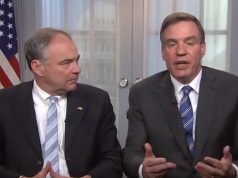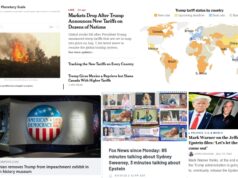From Sen. Mark Warner’s office:
IN SENATE HEARING ON CAPITOL RIOT, WARNER HIGHLIGHTS HOW RESPONSE TO VIOLENCE WAS SLOWED BY D.C. STATUS AS A NON-STATE
~ In first congressional hearing on Jan. 6 security failures, Warner also called on executive branch and Congress to focus on rising threat of violent anti-government extremist groups ~
WASHINGTON – Today, the Senate Rules Committee and Homeland Security and Governmental Affairs Committee convened the first congressional hearing examining the security failures that enabled a mob supporting former President Donald Trump to overrun the U.S. Capitol on January 6. At the hearing, senators heard testimony from four officials, three of whom resigned following the attack: former Senate Sergeant-at-Arms Michael Stenger, former House Sergeant-at-Arms Paul Irving, former U.S. Capitol Police Chief (USCP) Steven Sund and Robert Contee, acting chief of the Metropolitan Police Department (MPD).
In the hearing, Sen. Warner – a senior member of the Rules Committee – questioned the witnesses about whether the response to the security breach was delayed due to D.C.’s status as a non-state. While the National Guard in other states and territories can be called up by the governor, D.C. Mayor Muriel Bowser lacked authority on January 6 to mobilize the D.C. National Guard in defense of the Capitol. Instead, the D.C. National Guard is placed under the authority of the President of the United States. The commander of the D.C. National Guard, Maj. Gen. William J. Walker, has told the press that the Pentagon restricted his authority ahead of the mob invasion, and MPD acting Chief Robert Contee testified today that he was shocked by the administration’s “reluctance” on January 6 to approve the deployment of D.C. National Guard troops to quell the violence – resulting in a delay of several hours before troops arrived at the Capitol to restore order.
“I feel like the long-term discrimination against the District – and we’ve seen it in some of the COVID legislation where they did not receive the same kind of level of support that other states did – we saw it play out in real time on January 6, the hurdles from the previous administration. I have concerns that deployment of the Guard was affirmatively slowed down,” Sen. Warner said at today’s hearing. “As a supporter of D.C. statehood, I would like to see that move forward. But even short of that, trying to ensure that the mayor has appropriate powers going forward.”
Sen. Warner is an original co-sponsor of the Washington, D.C. Admission Act, legislation to make the District of Columbia the 51st state. He is also an original co-sponsor of the District of Columbia National Guard Home Rule Act, legislation to grant the District of Columbia full control over the D.C. National Guard and the Metropolitan Police Department.
At today’s hearing, the senators also heard a terrifying and moving firsthand account of the January 6 attack from USCP Captain Carneysha Mendoza.
At the hearing, Sen. Warner, the Chairman of the Senate Select Committee on Intelligence, also questioned whether the Federal Bureau of Investigation (FBI) was adequately sharing threat information with D.C. and Capitol police ahead of January 6. According to press reports, the FBI field office in Norfolk issued a field bulletin on January 5 warning of the potential for violence on January 6, but former USCP chief Sund testified today that he learned of the report only after the attack.
“I had a number of conversations [with the FBI ahead of January 6.] I called Director Wray on Monday the 4th, trying to express concerns that there might be this kind of activity. I never expected this level of violence. I had a number of conversations with senior FBI leadership on the 5th through the 6th. Candidly, I don’t think even the full FBI could have been fully informed of what was going to come to pass – but I felt like the FBI felt that they were in better shape in terms of intel and preparation than what came to be the case,” Sen. Warner said today.
Sen. Warner concluded, “Let me just say that my concern is that, in Virginia, we’ve seen these kind of anti-government extremists take to the streets in Charlottesville in 2017, resulting in the death of Heather Heyer. We’ve seen the same kind of groups come to the forefront on January 6. I think this is an ongoing threat to national security. I feel at times that, while the FBI and others have pointed this out, that it didn’t get the level of serious review that it should have with the prior administration. I know I felt at times that they did not want to take the information that was coming out of the FBI. I hope on a going-forward basis we’re going to be able to be more coordinated in terms of taking on anti-government extremism, whether it comes from the left or the right. This is a real, ongoing threat. I can tell you from our Intelligence Committee, that we’ve seen that many of these groups have connections and ties to anti-government extremist groups in Europe.”














